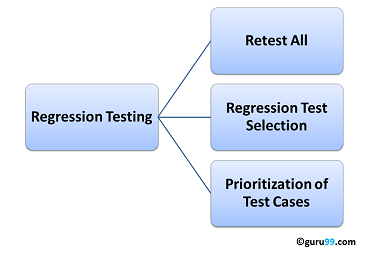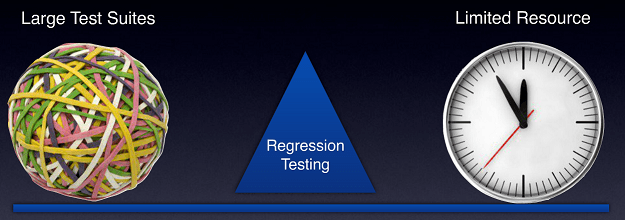What is Regression Testing?
Regression Testing is defined as a type of software testing to confirm that a recent program or code change has not adversely affected existing features. Regression Testing is nothing but a full or partial selection of already executed test cases which are re-executed to ensure existing functionalities work fine.
This testing is done to make sure that new code changes should not have side effects on the existing functionalities. It ensures that the old code still works once the latest code changes are done.
In this tutorial, we will learn
- Need of Regression Testing
- How to do Regression Testing
- Selecting test cases for regression testing
- Regression Testing Tools
- Regression Testing and Configuration Management
- Difference between Re-Testing and Regression Testing
- Challenges in Regression Testing
- Practical Application of Regression Testing Example with a Video
The Need of Regression Testing mainly arises whenever there is requirement to change the code and we need to test whether the modified code affects the other part of software application or not. Moreover, regression testing is needed, when a new feature is added to the software application and for defect fixing as well as performance issue fixing.
In order to do Regression Testing process, we need to first debug the code to identify the bugs. Once the bugs are identified, required changes are made to fix it, then the regression testing is done by selecting relevant test cases from the test suite that covers both modified and affected parts of the code.
Software maintenance is an activity which includes enhancements, error corrections, optimization and deletion of existing features. These modifications may cause the system to work incorrectly. Therefore, Regression Testing becomes necessary. Regression Testing can be carried out using the following techniques:

Retest All
- This is one of the methods for Regression Testing in which all the tests in the existing test bucket or suite should be re-executed. This is very expensive as it requires huge time and resources.
Regression Test Selection
Regression Test Selection is a technique in which some selected test cases from test suite are executed to test whether the modified code affects the software application or not. Test cases are categorized into two parts, reusable test cases which can be used in further regression cycles and obsolete test cases which can not be used in succeeding cycles.
Prioritization of Test Cases
- Prioritize the test cases depending on business impact, critical & frequently used functionalities. Selection of test cases based on priority will greatly reduce the regression test suite.
Selecting test cases for regression testing
It was found from industry data that a good number of the defects reported by customers were due to last minute bug fixes creating side effects and hence selecting the Test Case for regression testing is an art and not that easy. Effective Regression Tests can be done by selecting the following test cases –
- Test cases which have frequent defects
- Functionalities which are more visible to the users
- Test cases which verify core features of the product
- Test cases of Functionalities which has undergone more and recent changes
- All Integration Test Cases
- All Complex Test Cases
- Boundary value test cases
- A sample of Successful test cases
- A sample of Failure test cases
Regression Testing Tools
If your software undergoes frequent changes, regression testing costs will escalate. In such cases, Manual execution of test cases increases test execution time as well as costs. Automation of regression test cases is the smart choice in such cases. The extent of automation depends on the number of test cases that remain re-usable for successive regression cycles.
Following are the most important tools used for both functional and regression testing in software engineering:
1) Avo Assure
Avo Assure is a technology agnostic, no-code test automation solution that helps you test end-to-end business processes with a few clicks of the buttons. This makes regression testing more straightforward and faster.
Features
- Autogenerate test cases with a 100% no-code approach
- Test across the web, desktop, mobile, ERP applications, Mainframes, associated emulators, and more with a single solution.
- Enable accessibility testing
- Execute test cases in a single VM independently or in parallel with Smart Scheduling
- Integrate with Jira, Jenkins, ALM, QTest, Salesforce, Sauce Labs, TFS, etc.
- Define test plans and design test cases through the Mindmaps feature
2) Telerik Test Studio
Telerik Test Studio is an automated testing platform for web, desktop and responsive applications, supporting functional UI, load and RESTful API testing. Test Studio helps teams eliminate regressions and make sure their applications still work the way they did before any changes were introduced. It comes with standalone IDE and Visual Studio integration
Features:
- Visual test recorder for codeless end-to-end tests
- Cross-browser support
- Headed or three times faster headless test execution
- Element location based on element ID and image
- CI/CD Integration and Docker support for Continuous Testing
- Data-driven testing
- Remote test scheduling and execution
- Test results and reports
3) testRigor
testRigor helps you to directly express tests as executable specifications in plain English. Users of all technical abilities are able to build end-to-end tests of any complexity covering mobile, web, and API steps in one test. Test steps are expressed on the end-user level instead of relying on details of implementation like XPaths or CSS Selectors.
Features:
- Free forever public version
- Test cases are in English
- Unlimited users & Unlimited tests
- The easiest way to learn automation
- Recorder for web steps
- Integrations with CI/CD and Test case management
- Email & SMS testing
- Web + Mobile + API steps in one test
4) Eggplant
Eggplant’s AI-driven test automation streamlines regression testing through prioritization of test cases and minimization of test maintenance.
Features:
- AI-driven test execution enables Eggplant to test the most important areas of each release.
- Reuse testing models and scripts to test multiple versions with one set of assets.
- Reduce the burden of test maintenance through self-healing functional tests.
- Understand and focus in on problematic areas of your application that put your release at risk.
- Discover bugs that you would otherwise miss through automated exploratory testing.
- Reduce the time required to test key functionality of applications after updates.
Selenium: This is an open source tool used for automating web applications. Selenium can be used for browser-based regression testing.
Quick Test Professional (QTP): HP Quick Test Professional is automated software designed to automate functional and regression test cases. It uses VBScript language for automation. It is a Data-driven, Keyword based tool.
Rational Functional Tester (RFT): IBM’s rational functional tester is a Java tool used to automate the test cases of software applications. This is primarily used for automating regression test cases and it also integrates with Rational Test Manager.
Regression Testing and Configuration Management
Configuration Management during Regression Testing becomes imperative in Agile Environments where a code is being continuously modified. To ensure effective regression tests, observe the following :
- Code being regression tested should be under a configuration management tool
- No changes must be allowed to code, during the regression test phase. Regression test code must be kept immune to developer changes.
- The database used for regression testing must be isolated. No database changes must be allowed
Difference between Re-Testing and Regression Testing:
Retesting means testing the functionality or bug again to ensure the code is fixed. If it is not fixed, Defect needs to be re-opened. If fixed, Defect is closed.
Regression testing means testing your software application when it undergoes a code change to ensure that the new code has not affected other parts of the software.
Also, Check out the complete list of differences over here.
Challenges in Regression Testing:

Following are the major testing problems for doing regression testing:
- With successive regression runs, test suites become fairly large. Due to time and budget constraints, the entire regression test suite cannot be executed
- Minimizing the test suite while achieving maximum Test coverage remains a challenge
- Determination of frequency of Regression Tests, i.e., after every modification or every build update or after a bunch of bug fixes, is a challenge.
Practical Application of Regression Testing Example with a Video
Click here if the video is not accessible
Conclusion:
An effective regression strategy, save organizations both time and money. As per one of the case study in banking domain, regression saves up to 60% time in bug fixes(which would have been caught by regression tests) and 40% in money







